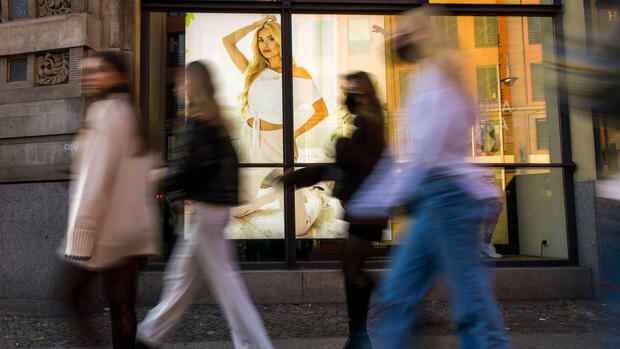Berlin The German economy is still growing. Gross domestic product (GDP) increased by 0.3 percent in the period from July to September compared to the previous quarter. This was announced by the Federal Statistical Office on Friday in a first estimate.
Contrary to expectations, Germany is not yet on the way to a recession. A technical recession is when GDP falls for at least two consecutive quarters. For the current quarter, however, almost all experts are firmly assuming a decline.
In the third quarter, however, the economists were quite wrong. The leading economic research institutes forecast a decline of 0.2 percent. The Federal Statistical Office refers above all to private consumption, which supported economic management.
The forecasters had already expected a much sharper slump in household spending in the third quarter. As a result of the sharp rise in gas, oil and electricity prices, consumers are reducing their consumption because they have to spend more money on their energy bills.
Top jobs of the day
Find the best jobs now and
be notified by email.
So far, however, they have obviously not done so as strongly as was expected. The subdued consumer mood in Germany has recently stabilized somewhat. The market researchers at the Gesellschaft der Verbraucherforschung (GfK) predict a slight increase in the consumer climate for October.
exceeded pre-crisis levels
One reason for the recovery may also be that gas prices have recently normalized somewhat. Thanks to the surprising growth, Germany exceeded the economic level from before the corona crisis for the first time in the third quarter. Compared to the fourth quarter of 2019, GDP was now 0.2 percent higher.
In the spring, the German economy was still growing slightly, by 0.1 percent, despite the effects of the Ukraine war. At the beginning of the year there was an increase of 0.8 percent due to catch-up effects after the corona crisis.
“Absolutely amazing,” commented LBBW economist Jens-Oliver Niklasch on the surprising growth. According to experts, however, this will be over for the time being in view of the energy crisis resulting from the Russian war against Ukraine.
“That should only be the calm before the storm,” commented Commerzbank chief economist Jörg Krämer on the development in the summer months, in which the federal government had put together relief packages such as fuel discounts and a 9-euro ticket.
The signs for the coming months are still rather bad. Private consumption is likely to slow down, as far from all price increases for gas, oil and electricity have reached consumers.
As a result, companies could not only be confronted with production cuts, but also with a slump in demand in the coming months. “As long as inflation remains high and there are doubts about an unrestricted energy supply, the consumer climate will not be able to noticeably and sustainably recover,” said GfK consumer expert Rolf Bürkl.
The leading economic research institutes expect GDP to fall by 0.6 percent in the fourth quarter. In the first quarter of 2023, the decline is expected to be 0.4 percent. “The fact that this is not even stronger is due to the high order backlog in the manufacturing sector,” write the institutes.
It would not start growing again until next spring. However, the institutes, like the Federal Statistical Office, point to a high degree of uncertainty in all current economic figures.
Various downside risks
The federal government had also expected a decline in economic output in the third quarter, as Economics Minister Robert Habeck (Greens) recently explained when presenting the autumn projection.
The better course could now ensure that the current year turns out to be a little better than the government has previously forecast. In the autumn projection, Habeck’s officials had only expected GDP to increase by 1.4 percent in 2022. Next year, Berlin expects a decline of 0.4 percent.
Definition: What is a recession?
The impending recession could also be clearer than the 0.4 percent. There are various downside risks. Despite Russia’s continued supply freeze, economic forecasters assume that Germany will not run out of gas in winter – but that cannot be ruled out.
Uncertainty about the extent to which consumer consumption will fall will also tend to increase. That depends above all on how much households use their savings to pay the high energy bills and continue to consume goods.
In times of crisis in the past, households saved more for fear of even worse times. Accordingly, consumption would fall even more sharply. However, in the first half of 2022, households already reduced their savings rate to 11.1 percent – and thus roughly to the pre-corona level. It remains to be seen whether this behavior is an expression of normalization after the high corona savings or just the result of rising prices.
In addition, in contrast to the consumer climate, other leading indicators are clearly pointing downwards, especially among companies. The important Ifo business climate index fell again in October, this time only slightly by 0.1 points to 84.3 points. However, the previous survey of the 9,000 executives in the German executive floors had already shown a significant decline.
With agency material.
More: Four risks that could turn a mild recession into a severe one
